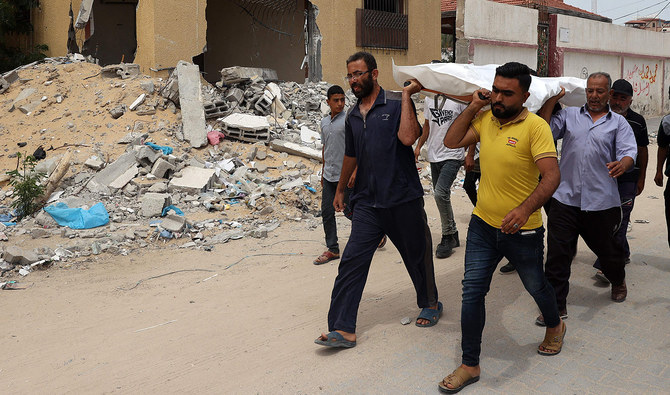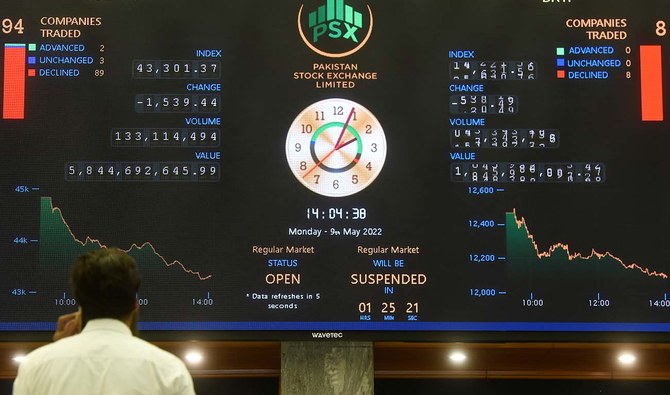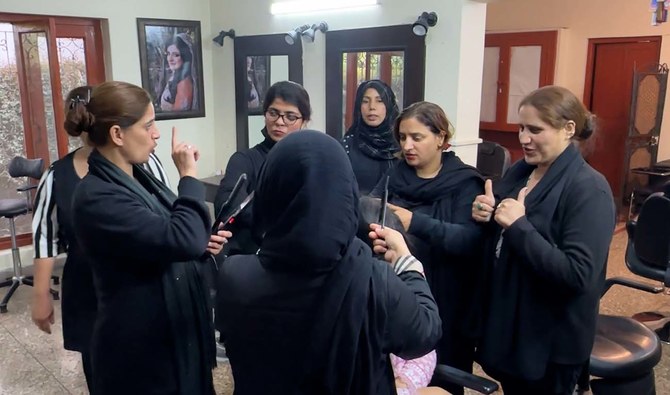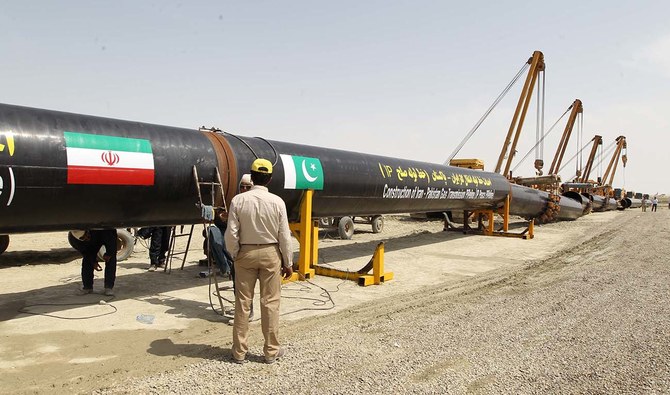ISLAMABAD: Pakistan said on Friday it joined the United Nations in calling for a “transparent and credible” investigation into the discovery of mass graves at two major hospitals in Gaza where over 34,000 Palestinians have been killed by Israeli attacks since October.
The discovery of the mass graves, said by Palestinian authorities to contain hundreds of bodies, have triggered calls by the UN rights chief and others for an international investigation. While not defined under international law, a mass grave is a burial site containing multiple bodies, the existence of which could be important in detecting possible war crimes.
Palestinian authorities said a grave site discovered at the Nasser hospital, the main medical facility in central Gaza, contained nearly 400 bodies. It was uncovered after Israeli troops pulled out of the city of Khan Younis.
Another grave site was also found by Palestinian authorities at the Al Shifa hospital in northern Gaza, which had been targeted by an Israeli special forces operation.
“Pakistan joins the call by the United Nations for a clear, transparent and credible investigation of mass graves and the massacre of men, women and children by the Israeli occupation forces,” the foreign office spokesperson said at a weekly briefing in Islamabad.
“An independent and impartial investigation must be held to ascertain the facts, fix responsibility and punish the perpetrators of war crimes and crimes against humanity in Gaza.
“We urge the international community, especially the backers of Israel to take urgent measures to bring an end to the war on the people of Gaza, lift the siege, protect civilians, facilitate humanitarian assistance and to hold to account the perpetrator of Gaza genocide.”
Currently, the International Criminal Court in The Hague has an active investigation into the attacks on Israel on Oct. 7 by Hamas and the response by the Israeli military.
The office of the prosecutor has jurisdiction in the Palestinian territories, but has not made any public comments about the discovery of mass graves.
Under the 1949 Geneva Conventions, to which Israel is a signatory, parties to a conflict must take all possible measures to prevent the dead from “being despoiled.” Customary international humanitarian law (IHL) calls for the dead to be respected, including a duty to prevent despoiling of graves and ensuring the identification and proper burial of human remains.
IHL also prohibits mutilation, desecration and other forms of disrespect toward the dead, while parties should take measures to protect grave sites, including those containing multiple human remains.
In 2002, in a case related to killings of Palestinians in the Jenin refugee camp in the West Bank, Israel’s Supreme Court ruled that the Israeli Defense Ministry was responsible under international law “for the location, identification, evacuation, and burial of the bodies” of Palestinians killed in fighting. The judges said bodies should not be buried in mass graves but handed over to the Palestinian authorities.
The International Criminal Court’s founding Rome Statute defines the desecration or mutilation of dead bodies as a war crime and this is banned as an outrage upon personal dignity.
Allegations by Palestinian authorities that the Israeli Defense Forces (IDF) had buried the bodies were “baseless and unfounded,” the IDF said in a statement. The graves were dug by Palestinians, it said, releasing footage showing the graves pre-dated IDF operations.
IDF forces searching for Israeli hostages had examined bodies buried near Nasser hospital and then returned them, the IDF said.
“The examination was carried out respectfully while maintaining the dignity of the deceased,” it said.
With inputs from Reuters
Pakistan joins call by UN for ‘credible investigation’ into mass graves discovery in Gaza
https://arab.news/rauwh
Pakistan joins call by UN for ‘credible investigation’ into mass graves discovery in Gaza

- Palestinian authorities say mass graves at Nasser and Al Shifa hospitals contain hundreds of bodies
- Pakistan says “independent and impartial investigation” must fix responsibility and punish perpetrators
Babar hoping paceman Rauf will regain full fitness and make an impact for Pakistan at T20 World Cup

- Fast bowler Rauf has been included in an 18-man squad for the upcoming tours of Ireland and England
- Pakistan has done well in last two T20 World Cups, reaching semifinals in 2021, final at 2022 tournament
ISLAMABAD: Pakistan captain Babar Azam is hoping Haris Rauf will regain full fitness after a shoulder injury and make an impact at next month’s T20 World Cup.
Fast bowler Rauf has been included in an 18-man squad for the upcoming tours of Ireland and England, with Pakistan delaying its 15-strong party for the World Cup in the United States and West Indies until May 22.
The fitness of Rauf, Mohammad Rizwan, Irfan Khan and Azam Khan will be assessed during the seven T20s against Ireland and England.
“I wasn’t expecting that he (Rauf) would recover so early and start bowling again,” Babar told reporters in Lahore on Monday as the team prepared to fly out to Ireland, where the first T20 will be played in Dublin on Friday.
“There’s pressure on him to make a comeback. There’s lot of talk going around on his injury and how he will respond to it. But I think he will make a good response because when you give yourself proper rest mentally and physically, you can make a different impact.”
Rauf has been out since dislocating his shoulder in late February during the Pakistan Super League. Since then he has gone through rehabilitation at the National Cricket Academy in Lahore.
The seven-member selection committee, which also includes Babar, have named fast bowler Hasan Ali, who last played a T20 international in 2022, as backup for Rauf.
Babar backed the inclusion of Hasan after pace bowlers Zaman Khan, Mohammad Wasim and the PSL’s top wicket-taker Mohammad Ali were omitted.
“There’s no injustice with anyone. We debated a lot on the World Cup combination and Hasan is there as backup for Rauf because of his experience,” Babar said. “Zaman and Ali are new-ball bowlers but we already have enough new-ball bowling options.”
Fast bowler Mohammad Amir, who played in two T20s against New Zealand after ending his retirement, Shaheen Shah Afridi, Naseem Shah and Abbas Afridi are Pakistan’s pace options.
Under Babar, Pakistan has done well in the last two T20 World Cups, reaching the semifinals in 2021 at the United Arab Emirates and losing to England in the final at the 2022 tournament in Australia.
The chairman of the Pakistan Cricket Board, Mohsin Naqvi, has promised a cash award of $100,000 to every player if the team wins the tournament.
“What happened in the past is in the past, unfortunately we couldn’t finish the way we wanted,” Babar said. “We’re doubly confident and believe we can bring the trophy home.”
Pakistan starts its campaign against host United States in Dallas on June 6 before taking on arch-rival India in New York three days later.
White-ball head coach Gary Kirsten will likely join the team in England after completing his Indian Premier League assignment with Gujarat Titans.
Pakistan stocks continue to rally on Saudi investment optimism, decline in inflation

- A 50-member delegation led by Saudi Arabia’s Assistant Minister of Investment Ibrahim Al-Mubarak arrived in Pakistan on Sunday
- Pakistan and Saudi Arabia have seen a flurry of bilateral visits in recent weeks that have fueled hopes of investment in South Asian country
KARACHI: Pakistan’s benchmark share index closed at another all-time high by registering a 1.2 percent gain as bulls celebrated the arrival of a high-level investment delegation from Saudi Arabia, analysts said on Monday.
The KSE-100 index witnessed a bullish trend, gaining an intraday high of 1,158.65 points that marked a 1.61 percent increase. It closed at 72,764.24 points, up by 1.20 percent.
Stock analysts said the major contributing factor behind the bullish close was the arrival of a 50-member Saudi business delegation in Pakistan for potential investments and a drop in inflation.
“Today’s all the bullish activity was because of the Saudi delegation visiting Pakistan to explore investment opportunities,” Sheheryar Butt, portfolio manager at Darson Securities, told Arab News.
The delegation, led by Saudi Arabia’s Assistant Minister of Investment Ibrahim Al-Mubarak, arrived in Pakistan on Sunday. It comprises representatives of some 30 Saudi companies from the fields of IT, telecom, energy, aviation, construction, mining exploration, agriculture and human resource development.
Butt said the encouraging remarks by the visiting Saudi investment minister on Monday also played a key role in keeping the market in the green zone.
Addressing an investment summit in Islamabad, the Saudi minister said Pakistan was a “high priority” economic opportunity and the Kingdom believed in the potential of Pakistan’s economy, demographics and talent as well as location and natural resources.
Speaking at the summit, Pakistan Finance Minister Muhammad Aurangzeb said foreign investment was vital to macroeconomic stability in Pakistan and the visit of Saudi investors was a link in this chain.
Auzrangzeb said Prime Minister Shehbaz Sharif’s successful visit to Saudi Arabia opened the way for economic cooperation between the two countries.
“The visit of a delegation of Saudi investors to Pakistan is also a part of paving the way for this economic cooperation,” the minister said. “The government is now moving toward privatization and PIA [Pakistan International Airlines] will also be privatized.”
He said export-led growth, foreign direct investment (FDI) and excess to capital were top priorities of the government, and it was working on short, medium and long-term strategies as well as structural economic reforms.
Ali Nawaz, CEO of Chase Securities, attributed the bullish trend at the stock market to the arrival of the Saudi investment delegation.
“This news likely injected optimism into the market as it suggests potential for increased foreign investment, bolstering investor confidence,” Nawaz said.
Other factors, he said, included a decline in inflation that fueled a positive sentiment.
“Lower inflation rates typically indicate a healthier economic environment, fostering expectations of potential interest rate cuts in the future,” he added.
Pakistan stocks continue to rally on Saudi investment optimism, decline in inflation

- A 50-member delegation led by Saudi Arabia’s Assistant Minister of Investment Ibrahim Al-Mubarak arrived in Pakistan on Sunday
- Pakistan and Saudi Arabia have seen a flurry of bilateral visits in recent weeks that have fueled hopes of investment in South Asian country
KARACHI: Pakistan’s benchmark share index closed at another all-time high by registering a 1.2 percent gain as bulls celebrated the arrival of a high-level investment delegation from Saudi Arabia, analysts said on Monday.
The KSE-100 index witnessed a bullish trend, gaining an intraday high of 1,158.65 points that marked a 1.61 percent increase. It closed at 72,764.24 points, up by 1.20 percent.
Stock analysts said the major contributing factor behind the bullish close was the arrival of a 50-member Saudi business delegation in Pakistan for potential investments and a drop in inflation.
“Today’s all the bullish activity was because of the Saudi delegation visiting Pakistan to explore investment opportunities,” Sheheryar Butt, portfolio manager at Darson Securities, told Arab News.
The delegation, led by Saudi Arabia’s Assistant Minister of Investment Ibrahim Al-Mubarak, arrived in Pakistan on Sunday. It comprises representatives of some 30 Saudi companies from the fields of IT, telecom, energy, aviation, construction, mining exploration, agriculture and human resource development.
Butt said the encouraging remarks by the visiting Saudi investment minister on Monday also played a key role in keeping the market in the green zone.
Addressing an investment summit in Islamabad, the Saudi minister said Pakistan was a “high priority” economic opportunity and the Kingdom believed in the potential of Pakistan’s economy, demographics and talent as well as location and natural resources.
Speaking at the summit, Pakistan Finance Minister Muhammad Aurangzeb said foreign investment was vital to macroeconomic stability in Pakistan and the visit of Saudi investors was a link in this chain.
Auzrangzeb said Prime Minister Shehbaz Sharif’s successful visit to Saudi Arabia opened the way for economic cooperation between the two countries.
“The visit of a delegation of Saudi investors to Pakistan is also a part of paving the way for this economic cooperation,” the minister said. “The government is now moving toward privatization and PIA [Pakistan International Airlines] will also be privatized.”
He said export-led growth, foreign direct investment (FDI) and excess to capital were top priorities of the government, and it was working on short, medium and long-term strategies as well as structural economic reforms.
Ali Nawaz, CEO of Chase Securities, attributed the bullish trend at the stock market to the arrival of the Saudi investment delegation.
“This news likely injected optimism into the market as it suggests potential for increased foreign investment, bolstering investor confidence,” Nawaz said.
Other factors, he said, included a decline in inflation that fueled a positive sentiment.
“Lower inflation rates typically indicate a healthier economic environment, fostering expectations of potential interest rate cuts in the future,” he added.
Pakistan’s deaf-staffed beauty salon provides economic opportunity, empowers hearing impaired

- There are seven deaf beauticians out of a total of 12 employed at Options Salon in Abbottabad
- According to the World Health Organization, deaf population in Pakistan is around 10 million people
ABBOTTABAD: Eight years ago, while offering a training class at her Options beauty salon in the northwestern Pakistani city of Abbottabad, Nighat Aftab received an unlikely application: that from a deaf girl who wanted to attend the training and join her salon.
“I didn’t have much experience working with such women and at first, I hesitated a little that how could I hire such a person whose language I don’t understand?” Aftab told Arab News in an interview earlier this month. “But then I said, ‘Come, join me’.”
Today, there are seven deaf beauticians out of a total of 12 employed at Options, which has since become a sanctuary for women with hearing and speech impairments, providing them economic opportunity, a chance to be financially independent and earn for their families, and a place where they can be part of a supportive, inclusive community.
According to the World Health Organization, the deaf population in Pakistan is around 10 million people. Pakistan has one of the lowest percentages of female labor force participation in South Asia and women with disabilities face even more impediments to employment.
“Previously, I used to work at a parlor in Islamabad where my salary wasn’t great, and I used to miss home a lot,” beautician Saima Mir told Arab News in sign language as Aftab translated for her.
“Now I am very happy. I like working here. There are many here who cannot hear and speak, it makes me happy.”
Others also said they felt a “sense of belonging” at the Options Salon.
“I have my mother and father. They are old. I feel frustrated at home as there is nobody with whom I can talk and share,” Isma Mushtaq told Arab News. “I come here and I spend time here happily.”
While many of the salon’s loyal customers are now used to communicating with the deaf staff members, that was not always the case, Aftab recalled, saying she faced criticism in the beginning by clients struggling to communicate with her workers. To bridge the gap, deaf workers were teamed up with those from the hearing community.
“The difficulties we faced [with communication] in the beginning got resolved over time,” said Sobia Khan, a beautician from the hearing community.
And the troubles had been worth it, Aftab said.
“I might have closed down the salon by now because my daughters are now married and I want to enjoy my own life but I am committed because of these young women [deaf workers] and I am unable to quit because their employment is attached to me,” she said.
“And because of them, Allah has blessed me with health. I am able to come to work daily, even though I am not that healthy, but I am happy here.”
Iran, Pakistan seek ways to complete gas pipeline project

- Both countries signed agreement to construct the pipeline from Iran’s South Fars gas field to Pakistan’s Balochistan, Sindh
- Tehran says has invested $2 bln to construct pipeline, but work on Pakistan side has been held up due to fears of US sanctions
KARACHI: Iran and Pakistan are looking at ways to complete a long-delayed gas pipeline project between the two countries, Iran’s Consul General to Pakistan, Hassan Nourian, said on Monday.
“We see political determination from Pakistan to complete the project,” he told reporters in the southern city of Karachi.
The countries signed an agreement to construct the pipeline from Iran’s South Fars gas field to Pakistan’s Balochistan and Sindh provinces in 2010, but work on Pakistan’s portion has been held up due to fears of US sanctions.
The 1,900 kilometer (1,180 mile) pipeline was meant to supply 750 million to one billion cubic feet per day of natural gas for 25 years to meet Pakistan’s rising energy needs.
Tehran says it has invested $2 billion to construct the pipeline on its territory. Pakistan, however, did not begin construction, citing international sanctions on Iran as the reason.
In 2014, Islamabad asked for a 10-year extension to build the pipeline, which expires in September this year. Iran can take Pakistan to international court, industry watchers have said.
Faced with potential legal action, Pakistan’s caretaker administration this year gave the go ahead in principal to commence plans to build an 80km segment of the pipeline.
In March, Islamabad said it would seek a US sanctions waiver for the pipeline. The US, however, said it did not support the project and cautioned about the risk of sanctions in doing business with Tehran.
Nourian on Monday said the pipeline did not come under international restrictions, and that the two countries were discussing the issue.
He did not answer a question about the potential for Iran to take legal action against Pakistan if it did not complete its side of the pipeline this year.
Pakistan, whose domestic and industrial users rely on natural gas for heating and energy needs, is in dire need for cheap gas with its own reserves dwindling fast and LNG deals making supplies expensive amidst high inflation.
Iran has the world’s second-largest gas reserves after Russia, according to BP’s Statistical Review of World Energy, but sanctions by the West, political turmoil and construction delays have slowed its development as an exporter.










